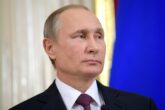December 14, 2018
Congress must face reality in exposing Russian aggression
The shakeup of members of the new Congress provides an opportunity for changing United States foreign policy. After two years of criticizing much of what the Trump administration has done, Congress has tools at its disposal to push back or alter course. On Russia, House Democrats are likely to pursue a much tougher course, writing new sanctions legislation to target foreign adventurism and interference. To be effective, however, they will need to keep in mind three broad issues of oligarchs, sovereign debt, and operational resources needed to underwrite their efforts.
To start, Democrats need to maintain perspective on what sanctions on Russian oligarchs can and cannot accomplish. The Trump administration already delivered a serious blow to Russian elites and their business interest when it sanctioned Oleg Deripaska and his corporations. The Treasury Department identified an extremely wealthy individual engaged in illicit and threatening conduct, believed to be close to Vladimir Putin, and imposed the toughest financial tools at its disposal. Thus, Deripaska has entered a tortured process to wind down control of those enterprises. He and his money have become toxic assets for other global companies, a status that other wealthy and influential Russians would like to avoid.
However, the treatment of Deripaska has not changed the calculus for Putin or his aggressive approach to the United States and his neighbors. The Minsk agreements are no closer to fulfillment and Russia has only increased aggression against Ukraine. Moscow still supports allies such as Bashar Assad. The lesson here is that while oligarch sanctions can inconvenience members of the Russian elite, their complaints about their treatment at the hands of the United States fall on deaf ears in the Kremlin. In their interests, Russians who did what they were told in order to operate lucrative businesses have neither the inclination nor the leverage to push back on the policies and priorities of the Kremlin.
Read the full article in The Hill.
More from CNAS
-
Trump ‘Humiliated’ as Putin Sends Clear Message That He Doesn’t Care About US
"Putin is not playing ball." Putin's Palm Sunday attack on Sumy is "embarrassing for the White House" as it comes just days after Steve Witkoff met with the Kremlin, says adju...
By Jim Townsend
-
The Hidden Past and Uncertain Future of the U.S. and Ukraine with Celeste Wallander
Under the Trump administration, U.S. support for Ukraine is no longer guaranteed. President Trump's pause on aid and intelligence to Ukraine in March may have been brief, but ...
By Andrea Kendall-Taylor, Jim Townsend & Celeste Wallander
-
Is Russia Under Pressure?
Since 2014, the United States and its allies have provided increasing military support to Ukraine while imposing more and tougher economic sanctions on Russia, especially sinc...
By Jeffrey Edmonds
-
Sharper: Russia and the Axis of Upheaval
Russia’s 2022 invasion of Ukraine served as a dramatic catalyst for strengthening the global axis of upheaval. To sustain its war effort, Russia has imported Iranian weapons a...
By Charles Horn




